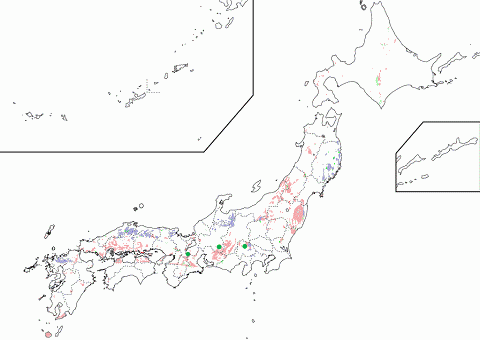REE Miarolitic Pegmatite
Chemical Process (Liquid-phase Growth) - Closed system under ground (Melt precipitation)
Abbreviation
MI-REE
Classification
REE Miarolitic subclass < (NYF family) < Miarolitic class < Granitic pegmatite
Required Geological Setting
Occurrence
Pegmatites with abundant miarolitic cavities (vugs) formed by gas exsolved from I-type granite magma as the result of pressure reduction. Pegmatites are observed in I-type granite associated with caldera complexes. Pegmatites are emplaced at shallow depth less than 0.15 GPa and less than 200 degree. Distribution of miarolitic cavities is not uniform reflecting surronding geological conditions, and generally tends to rich at the upper part of granite stocks. Mineral assemblages are variable and can be understood as mixture of two end-member types: the topaz-beryl type and the gadolinite-fergusonite type. The REE miarolitic subclass is characterized by abundant Y, Be, Nb, F, Ti, U, Zr, and light rare-earth elements such as La, Ce, and Nd.

Distribution of REE miarolitic pegmatites described in this site. Red is ilmenite-series granites corresponding to S-type granites, and blue is magnetite-series granites corresponding to I-type granites.
Mineral Assemblages (Major minerals)
Quartz, Microcline, Albite, Muscovite
Mineral Assemblages
Beryl. Amazonite, Zinnwaldite, Fluorite, (Zircon, Euxenite-(Y), Xenotime-(Y), Monazite-(Ce), Cheralite-(Ce), Cassiterite)
Localities
- Mount Tanakami (Topaz)
- Naegi (Topaz)
Related Occurrences
- Pegmatite (Abyssal)
- Pegmatite (Muscovite)
- Pegmatite (Muscovite-Rare element)
- Pegmatite (Rare element, Allanite)
- Pegmatite (Rare element, Euxenite)
- Pegmatite (Rare element, Gadolinite)
- Pegmatite (Rare element, Titanium)
- Pegmatite (Rare element, Beryl)
- Pegmatite (Rare element, Phosphate)
- Pegmatite (Rare element, Spodumene)
- Pegmatite (Rare element, Petalite)
- Pegmatite (Rare element, Lepidolite)
- Pegmatite (Rare element, Elbaite)
- Pegmatite (Rare element, Amblygonite)
- Pegmatite (Rare element, Albite-Spodumene)
- Pegmatite (Rare element, Albite)
- Pegmatite (Miarolitic, REE)
- Pegmatite (Miarolitic, Li)
- Pegmatite (Gabbro)